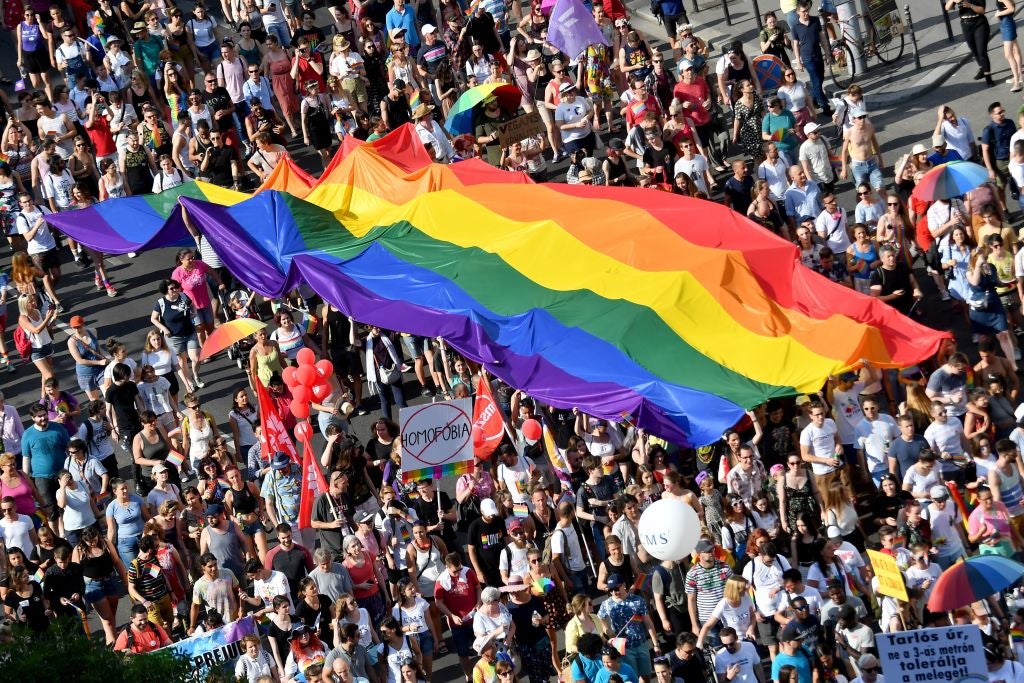Orbán’s LGBT+ crackdown extends to schools
Proposed legislation would see ban on dissemination of LGBT-related content in schools

Hungary’s Fidesz government proposed legislation on Thursday to ban the dissemination of LGBT-related content in schools.
The amendment to a bill on punishment for paedophilia would make it illegal for people under the age of 18 to be shown content which, in its words, encourages gender change or homosexuality.
This latest move to restrict sex education in Hungary is the most drastic step yet by prime minister Viktor Orbán’s government to restrict what it calls “gender propaganda”, in defence of traditional “Christian values”.
The proposed legislation was swiftly condemned by organisations including Amnesty International, Budapest Pride, and Hungarian organisations fighting for LGBT+ rights.
While banning the “promotion” of homosexuality and gender change in education, the amendment would also see any LGBT-positive content accessible to younger people restricted, whether in films, books or public advertisements.
A list of approved institutions would meanwhile be drawn up for the provision of sex education in schools.
The Háttér Society, Hungary’s oldest LGBT+ organisation, issued a statement that the tabled legislation would “significantly curb freedom of speech and children’s rights”, arguing the move “endangers the mental health of LGBTQI youngsters and prevents them getting access to information”.
Tamás Dombos from the Háttér Society told The Independent that “the amendment is a clear violation of the right to freedom of expression, the right to education, and the right to non-discrimination.”
“The legislation will have a very detrimental impact on LGBT+ minors, as they will not be able to access vital information about gender and sexuality. They will not be able to read about these issues, or discuss them with anyone in school. They will be surrounded by a social climate which denounces them as sick, while their sexual orientation or gender identity will be perceived as something shameful, and to be hidden.”
Orbán’s Fidesz government has escalated its actions to limit the freedoms of LGBT+ in recent months. In December 2020, Hungarian lawmakers approved a constitutional amendment stipulating that a mother is a woman and a father is a man.
The change was justified with the argument that modern western ideology necessitates the guaranteeing of a child’s “right to identify with their gender at birth”.
The government also limited gay adoption rights – while earlier, it passed a law making it legally impossible for people to change their gender. “Sex at birth” is recorded in the civil registry and Hungarians are only allowed to choose from a range of “male” and “female” names in accordance with their ascribed sex.
Now, Fidesz is moving a step further by attempting to limit exposure for the LGBT+ community throughout society.
The proposed ban on the promotion of LGBT+ culture in the public sphere was foreshadowed in 2019 by controversy over a Coca Cola “Love is Love” advertising campaign which depicted same-sex couples.
Fidesz MPs called for a boycott of the brand, and an online petition warned that “if Hungarian society accepts this, there will be more and more tests”.
Fidesz’s proposed new legislation has been likened by critics to anti-LGBT+ models used in Russia in China, which punish the dissemination of homosexual “propaganda”.
“Similar legislation in Russia has been found to be in violation of international human rights norms by the UN Committee on the Rights of the Child, the UN Human Rights Committee and the Venice Commission of the Council of Europe,” said Dombos.
The government’s treatment of LBGT+ people is becoming a key topic of debate ahead of Hungary’s election in 2022, with opposition leaders such as Budapest mayor Gergely Karácsony publicly expressing their support for the LGBT+ community.
Karácsony’s “Budapest for Everyone” programme aims to promote tolerance in the city, and the liberal mayor has claimed “communities who feel the need for more acceptance can count on me”.
Fidesz, on the other hand, positions itself as the protector of traditional values – a bastion against western progressivism. Orbán, a self-styled “illiberal”, portrays himself and his government as holding back a tide of change which he believes threatens to dismantle Hungarian culture.
Greater LGBT+ freedoms and uncontrolled migration are presented by Fidesz to more conservative parts of Hungarian society as the main agents of such destructive change. Hungary has been a staunch opponent of the EU’s migrant quota system for asylum seekers, refusing to take in a single refugee under the scheme.
The EU has long criticised the Hungarian government for its attitude on both issues, and recently strengthened its policies to protect European LGBT+ communities. New measures unveiled late last year introduced tougher punishments for hate crime – including homophobic speech – and enhanced protection for same-sex couples throughout the bloc.
This year, the EU responded to controversial “LGBT-free zones” in Poland – Hungary’s Visegrád Four ally – by declaring the Union an “LGBT freedom zone”.
Hungary’s stance on LGBT+ rights has put it at loggerheads with Brussels – but Fidesz’s decade-long grip on power is set to face its sternest test yet in next year’s general elections. Opposition parties from across the political spectrum are coming together to form a United Opposition list, and political commentators are describing the election as a referendum on Orbán’s style of leadership.
Fidesz and the United Opposition are currently neck-and-neck in the polls ahead of the vote next spring.
Join our commenting forum
Join thought-provoking conversations, follow other Independent readers and see their replies
Comments
Bookmark popover
Removed from bookmarks